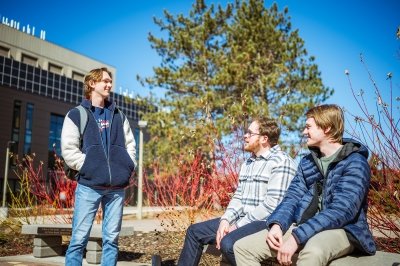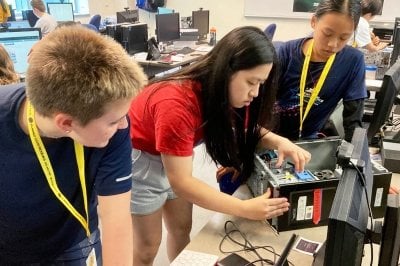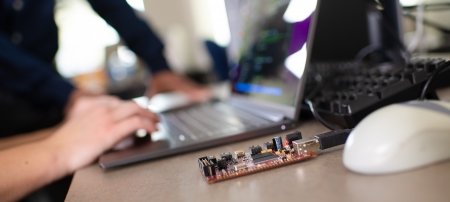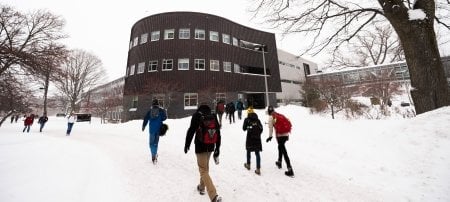Today’s youth immerse themselves in technology at a young age, learning skills they will use throughout their lives. But many hazards accompany those cool smartphone and computer applications, and it’s never too early to be aware of the risk.
Michigan Tech Cybersecurity Students Share their Knowledge and Passion
Just like looking both ways before crossing the street, children can be prepared to protect themselves from cyber threats. Kids can soak up basic cybersecurity skills as rapidly as they pick up new technologies.
Michigan Tech students from the CyberCorps® Scholarship for Service (SFS) program and the MTU RedTeam, a cybersecurity-centric student organization, are showing them the way through CyberHuskies, a team of Houghton-area middle and high school students excited about cybersecurity and computer topics.

On Saturday evenings during the academic year, SFS students teach these enthusiastic youth about security concepts and guide them through hands-on labs. The SFS students have also coached CyberHuskies to impressive finishes in competitions that help them practice the skills they are learning. All local youth are invited to join CyberHuskies and membership is free.
SFS student Aston Purdom says the best part of volunteering for CyberHuskies is sharing his cybersecurity knowledge and experience with younger students who are eager to learn more.
“I get a sense of fulfillment from passing down what I have learned to those bright students and helping them further encourage their education,” Purdom says. “The students are enthusiastic about taking on challenges and they have a great time working together.”
RedTeam student Andrew Martin also enjoys seeing younger students get excited about computing and cybersecurity. “Working with them enriches my education and allows me to master the fundamentals as I explain essential concepts to students who might not understand more technical language.”
Cybersecurity Competitions
In their first-ever National Cyber League (NCL) competition, in April 2023, two teams of CyberHuskies middle and high school students placed 25th and 57th among 600 teams, earning a ranking of 17th in the nation. The NCL is a community and virtual training ground that gives youth opportunities to develop and demonstrate their technical cybersecurity skills.
In the 2022 Michigan Governor’s High School Cyber Challenge (GHSCC), one CyberHuskies team finished in the top 10, competing against more than 600 students from across Michigan. Four additional CyberHuskies teams finished in the top 100. The GHSCC competition tests students on their knowledge of cybersecurity, computer science, and information technology.
And, in the 2022 CyberPatriot contest, one CyberHuskies team secured the No. 7 spot in the platinum tier, and a second team ranked No. 7 in the gold tier. Nationally, 5,000 teams and over 20,000 students competed in the event, which puts high school and middle school students in charge of securing virtual networks. In the 2021 CyberPatriot event, a CyberHuskies team from Houghton Middle School captured first place. CyberPatriot aims to inspire K-12 students toward careers in cybersecurity and other STEM disciplines critical to our nation’s future.
SFS students also organize an annual “WonderHack” capture the flag event for middle and high school students and teachers in Michigan. In the 36-hour competition, players complete a collection of cybersecurity challenges and are awarded a flag for each challenge they correctly complete. At the end of the competition, the flags are tallied to determine the best players and teams, and top winners receive special gifts.
GenCyber Summer Camps
Michigan Tech students also contribute to K-12 cybersecurity education through their work as assistants for the Michigan Tech GenCyber camps. Michigan Tech has held six GenCyber camps since 2019. In 2022 and 2023 alone, the camps provided cybersecurity training to more than 150 middle school and high school teachers and youth from across the country.
SFS student Matthew Bailey, who has worked as an assistant for the GenCyber camps, liked making connections with the kids and knowing that he was contributing to their learning. “The kids ask a ton of questions and want to know everything about everything,” he says. “You can literally see the learning happen. It’s rewarding that the things I’m spending time on are being used in a meaningful way. It’s different from school, where the end goal is years away.”
GenCyber is hosted by Michigan Tech’s Summer Youth Programs and the College of Computing and funded by the National Security Agency and the National Science Foundation. Camp activities include hands-on exercises, interactive lectures, games, career exploration, and campus tours. All camp activities are free, including tuition, activities, and room and board.
CyberCorps Scholarship for Service
Coordinated and conducted by multiple departments and faculty across campus, the CyberCorps Scholarship for Service (SFS) national scholarship program is designed to help recruit and train the next generation of cybersecurity professionals. A multimillion-dollar grant project awarded to Michigan Tech in 2021, SFS funds two- or three-year full scholarships for up to 20 cybersecurity undergraduate and graduate students. In return for their scholarships, following graduation, SFS recipients agree to work in a federal, state, local, or tribal government cybersecurity-related position for a period equal to the length of the scholarship.
“The CyberCorps scholarship is such a blessing,” says Bailey. “I am so fortunate to be one of the students selected. It lifts a burden from my shoulders and allows me to put my full focus on school, knowing that the rest is taken care of. It is not an exaggeration to say that it is life-changing.”
MTU RedTeam Leads the Pack
In the fall 2023 National Cyber League (NCL) individual competition, two Michigan Tech RedTeam members ranked in the top 100 out of 7,930 players across the nation: computer science major Ryan Klemm placed fifth, the best RedTeam record in the NCL individual games since 2017; and cybersecurity major Noah Holland placed 40th. In team competition, the RedTeam was ranked 11th out of 454 teams.
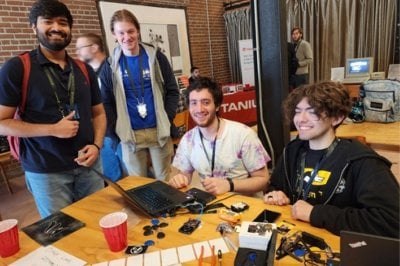
In the spring 2023 NCL team competition, two RedTeam teams placed 30th and 199th out of 3,909 teams. At the 2023 CyberSEED Capture the Flag competition in March 2023, RedTeam 1 placed third with 2,390 points and 93.41 percent accuracy, earning a $2,000 prize. Team 2 placed 73rd and Team 3 finished 99th.
Michigan Governor Gretchen Whitmer personally recognized the Michigan Tech RedTeam for finishing eighth in the National Cyber League fall 2022 competition.
The RedTeam is a registered student organization that promotes a security-driven mindset among MTU students and provides a community and resource for those wishing to learn more about information security. The group is advised by faculty members Bo Chen, Department of Computer Science, and Yu Cai, Department of Applied Computing.
Michigan Technological University is an R1 public research university founded in 1885 in Houghton, and is home to nearly 7,500 students from more than 60 countries around the world. Consistently ranked among the best universities in the country for return on investment, Michigan's flagship technological university offers more than 120 undergraduate and graduate degree programs in science and technology, engineering, computing, forestry, business, health professions, humanities, mathematics, social sciences, and the arts. The rural campus is situated just miles from Lake Superior in Michigan's Upper Peninsula, offering year-round opportunities for outdoor adventure.

